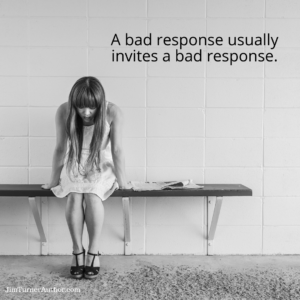 What does it take to make “I’m sorry” real?
What does it take to make “I’m sorry” real?
There is a life changing principle for both disconnected and connected men and women tucked away in 2 Corinthians, chapter 7. It sounds simple, the words “I’m Sorry” are more complicated than just saying simple words. The principles are often missed because we tend to be devotional readers of the Bible and not in-depth students of it. We read over truths like this without stopping to think about how they apply to our lives. But without this principle, apologies are often wishful thinking and empty words.
Paul starts chapter seven with the word ‘since’. Which means he is making a conclusion about the things he said before. Since those things, then these things. What he’s referring to are all the benefits of being a child of God he’s enumerated starting in chapter five or perhaps before.
Let’s Take A Look
Things like having a heavenly home after we die (chapter 5:1), that Jesus died for all of us so we have the power of unselfishness (chapter 5:15), that we are new creations (chapter 5:17), that our sins are not counted against us (chapter 5:19), that we are the temple of God (chapter 6:16), that God desires to live with us and be with us (chapter 6:16), that God will be a Father to us and we will be His children (chapter 6:18).
‘Since’ we have these and many other blessings and honors in Christ, then we are to respond in ways that reflect these back to God. Paul says we are to cleanse ourselves from every defilement of body and spirit. (chapter 7:1) Which means to partner with the Holy Spirit in our sanctification. We are being made holy and fit for the Lord’s presence, so let’s cooperate in what the Spirit is doing.
One of the ways he encourages us to cooperate is found in chapter seven, verses 9-11. And it contains the essential principle of how to properly apologize. The story goes like this, Paul had written to the Corinthians with a strong list of rebukes for things they were doing in their church. Things that hurt their fellow Christians. Things that were offensive, sinful and that break God’s heart.
It’s much like when your spouse tells you the things you do to hurt her or him. If not taken seriously, the offense will continue and the hurt will deepen.
When someone points out our failures, we have a choice to make in response. Paul, in this passage, is addressing the response the Corinthians made to his rebuke. We’ll get to that response as we cover this passage. For now, make no mistake, his rebuke was hard, painful, and exposed the sinfulness of the Corinthians. And we don’t typically like our sins to be exposed and corrected.
When our spouse or loved ones do the same, expose and/or correct us, it hurts. Many of us do not respond well. Rebuke and correction are often taken as undue criticism even if they are meant and presented in love. We get defensive, we turn around and blame them for our behavior, we clam up, we hide, we run. Let me challenge you to take a moment to assess how you respond to the criticisms of your spouse.
Look at the fourth sentence of the previous paragraph. Could you categorize your typical response to criticism (rebuke, correction) by one of the qualities in this list? If so, I have a question for you. What happens inside you in the moments BEFORE you respond?
STOP READING FOR A MOMENT and think about that question.
Your spouse is the closest person to your heart. Therefore, when they speak a word of correction, disappointment, or criticism, the cut is deep, immediate, and often very painful. We build habitual, knee-jerk responses to blunt the pain.
Our responses often become a return blow that cuts our spouse even deeper, causing more pain. Then their response kicks in and soon you are in an all out knife-fight. Some emotional thrusts are blocked, old wounds reopened, new cuts sting, and you both may end up bleeding and angry. Many couples repeat this cycle over and over, desperate for healing and a way forward, but finding it impossible to get out of the fight zone.
Stop The Cycle
I’m sure Paul knew, when he wrote the first letter, the Corinthians could have replied poorly. They could have launched a counter-attack against him and his authority (there are some hints in chapter 11 that some tried). But, in love, he sent the letter anyway. Much like a spouse who loves us and sees our behavior as destructive to ourselves or others, lovingly points out our issues.
Many spouses quake in fear at the thought of approaching their spouse with a word of loving correction. Paul also may have been fearful of the Corinthians’ response. But people who truly love others like God loves them will overcome their fear and speak the truth in love. (Ephesians 4:15) True love speaks truth regardless of the response of the person spoken to.
So Paul spoke and the Corinthians responded. Their response was different than some of the examples I gave. They responded in a way that Paul praised and encouraged. It was a response that made their Heavenly Father happy. They responded in a way that every good man or woman should respond. Their response illustrates the principle of a genuine apology and teaches us how to do it. We’ll learn about that response in our next post.

